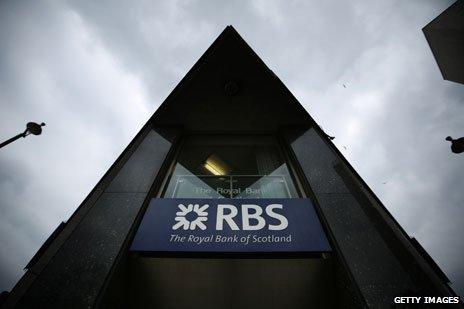Commission waters down RBS break-up call
- Published
- comments

And another thing about Royal Bank of Scotland.
I have learned that the Parliamentary Commission on Banking Standards has watered down a proposal for the residual £40bn-ish of bad assets of RBS to be hived off and kept in the public sector, as a precursor to the rest of the bank being privatised.
You may recall that last week I reported that the draft report, written by the commission's chairman Andrew Tyrie, had called for such a break up.
But a number of commission members, while not opposed ideologically to such a break-up of RBS, argued that the commission had not carried out the kind of forensic analysis necessary to underpin such a firm recommendation.
They heard a passionate argument from the soon-to-retire governor of the Bank of England that cleaning up RBS in this way would give it back its mojo (so to speak).
But that was about it.
So the finalised report, which was agreed by all 10 commission members yesterday afternoon, after three days of private debate, will say there is a good case for dismantling RBS but will fall short of stating that it must be done.
Instead it will urge the Treasury to carry out the kind of forensic analysis of such an RBS reconstruction which the commission did not have the time to do - and report back in a few months.
Which will come as something of a relief to the chancellor, who is not implacably opposed to retaining the bad bits of RBS, but has also been told by the departing chief executive of RBS, Stephen Hester, that the bank is well on the way to being sanitised by its own efforts.
Also, the technical challenges of hiving off £40bn of toxic loans and investments - such as fixing a price for them which is neither seen by the European Commission as too high (and in effect state aid to RBS), nor so low that it smashes a hole in RBS's capital resources - won't be easy.
Anyway, the point is that the question of whether the eventually privatised RBS will be super clean or not will remain an open one for some weeks or months yet.
By the way, what I thought was most striking in my interview with Stephen Hester last night is that he volunteered his confidence that taxpayers would be able to get back all the £45bn of equity they invested in RBS to keep it alive five years ago.
Stephen Hester: "I'm content with the board's perspective on this, there is no fight"
As I said on the 10 O'Clock news last night, his choice of £45bn as the sum needed to be repaid, has great political significance.
It is the pure cash sum which was invested in RBS by the last Labour government - and at this moment the shares that were bought with the £45bn are worth many billions of pounds less than that (normally I would tell you how many billions less, but I am a long way from a screen, so please forgive my crude approximation).
Here is the thing. My understanding is that UK Financial Investments, which manages taxpayers' stakes in the banks for the Treasury, agrees with Mr Hester that the £45bn can be repaid, if the privatisation is carried out in phases over many years.
However, there are others around Mr Osborne urging him to go for a faster privatisation, at the risk of getting back much less than the £45bn - and have told him he can blame his Labour predecessor as chancellor, Alistair Darling, for overpaying for that 81% RBS stake.
Whether or not Mr Darling overpaid is a tricky one. Certainly RBS shares tanked after the state rescue. And the prospect of the Treasury making a fat profit on the privatisation is probably slim to none.
But if, as Mr Hester says, there is a prospect of retrieving the £45bn from a phased privatisation over several years, then many would say better to be slow and patient with the sale rather than hurried and loss-generating.
Although Mr Hester and Mr Osborne would agree on not waiting forever to begin that journey to loosening state control.